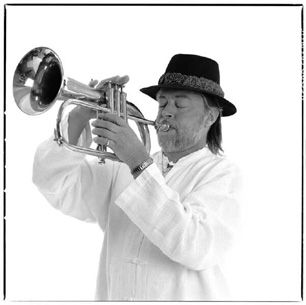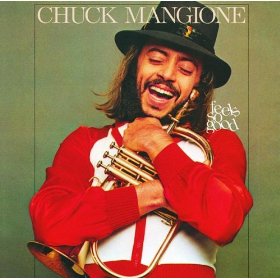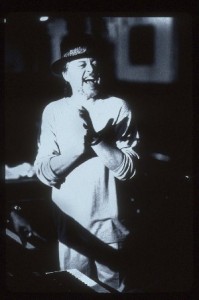 The first album I ever bought with my own money (earned, I think, by babysitting for one of the neighborhood kids) was a two-cassette version of Chuck Mangione’s 1978 concert recording An Evening Of Magic: Live At The Hollywood Bowl
The first album I ever bought with my own money (earned, I think, by babysitting for one of the neighborhood kids) was a two-cassette version of Chuck Mangione’s 1978 concert recording An Evening Of Magic: Live At The Hollywood Bowl![]() . This album, if you’ll forgive my salty language, kicks ass.
. This album, if you’ll forgive my salty language, kicks ass.
An Evening of Magic was made on the tour for the album that preceded it — Mangione’s chart-topping record Feels So Good![]() — and it features the same band. Chuck’s band on this record is, to my ear, the best he ever had. These five guys — Chuck on flÁ¼gelhorn and electric piano, Chris Vadala on saxophones and flute, Grant Geissman on guitar, Charles Meeks on the bass, and James Bradley, Jr. on drums — work together in that way that every great band should. They anticipate each others’ moves, breathe as one, and constantly find new heights during both the solos and the ensemble passages. The quintet is augmented by an orchestra, but it’s the five-man unit that forms the heart of this recording. I still find it just as thrilling as I did in the late 80s when I bought those cassettes.
— and it features the same band. Chuck’s band on this record is, to my ear, the best he ever had. These five guys — Chuck on flÁ¼gelhorn and electric piano, Chris Vadala on saxophones and flute, Grant Geissman on guitar, Charles Meeks on the bass, and James Bradley, Jr. on drums — work together in that way that every great band should. They anticipate each others’ moves, breathe as one, and constantly find new heights during both the solos and the ensemble passages. The quintet is augmented by an orchestra, but it’s the five-man unit that forms the heart of this recording. I still find it just as thrilling as I did in the late 80s when I bought those cassettes.
 I’ve seen Mangione twice in concert. Once was a 25th reunion show of the Feels So Good band, and they were just as good the second time around. I saw him again at the Eastman Theatre in his hometown of Rochester, NY, during a massive production in the mid-’90s that included many of his bandmates from years past. Also a thrilling show.
I’ve seen Mangione twice in concert. Once was a 25th reunion show of the Feels So Good band, and they were just as good the second time around. I saw him again at the Eastman Theatre in his hometown of Rochester, NY, during a massive production in the mid-’90s that included many of his bandmates from years past. Also a thrilling show.
For many “hardcore” jazzheads, admitting a burning passion for Chuck Mangione just isn’t cool. I think a large part of that stems from the fact that Mangione became a household name with the song “Feels So Good,” which hit #2 on the Billboard 200 in 1978. The album itself was #1 on the Billboard Jazz Albums chart the year before. (Remember when there was a Billboard Jazz Albums chart? Me either.) In subsequent years, Mangione has appeared everywhere from Magnum, P.I. to King of the Hill. And while those appearances seem good-natured, it always feels to me like there’s a bit of condescension, a knowing wink, happening too. (“Aren’t we ironic? It’s Chuck Mangione, people!”) It’s so rare for jazz to become popular that there must be something wrong with it, right?
The thing is, sometimes popular music is also good music. In the case of “Feels So Good,” Mangione wrote an immediately singable melody, and Grant Geissman crushes his guitar solo in one of my all-time favorite performances. I like my music in all shapes and sizes, and one of those shapes is melodic. I’ll get crazy to a free-blowing workout any day, but I also love a solo so melodic that it could be a tune on its own. That’s what Geissman achieves on “Feels So Good.”
 “‘Feels So Good’ is a beautifully written composition,” drummer Jae Sinnett told me recently. Sinnett is an active musician, educator and broadcaster who played a series of shows in 1988 with Mangione. “If it were released today, however, it wouldn’t be a hit in my view. Not because of lack of commercial appeal, but because it would be considered too hip for today’s commercial radio formats.”
“‘Feels So Good’ is a beautifully written composition,” drummer Jae Sinnett told me recently. Sinnett is an active musician, educator and broadcaster who played a series of shows in 1988 with Mangione. “If it were released today, however, it wouldn’t be a hit in my view. Not because of lack of commercial appeal, but because it would be considered too hip for today’s commercial radio formats.”
Mangione himself is an underappreciated soloist. The guy can really play his horn, and I’ve seldom heard anyone sound as powerful and as lyrical on the difficult flÁ¼gelhorn as he does. His range alone is impressive — he sounds just as comfortable at the extreme top end of the horn as he does when playing in the flÁ¼gelhorn’s more natural middle register.
Trumpeter and bass clarinetist Matt Lavelle agrees: “He’s a great flÁ¼gelhorn player, and composer, too. Feels So Good was my first ‘trumpet’ record as a kid.”
He’s also one of those writers from whom melodies flow like water down a mountain. He writes gorgeous ballads (see “Bellavia” or “Chase The Clouds Away”), brings the funk (“Hill Where The Lord Hides” or “Fun And Games”) and throws down some up-tempo tunes, too (“Main Squeeze” is a prime example). And he’s never confined himself to the standard quintet format. His film soundtrack Children Of Sanchez![]() is a fully-orchestrated tour de force that’s every bit as memorable and tuneful as his small-band hits.
is a fully-orchestrated tour de force that’s every bit as memorable and tuneful as his small-band hits.
 To the casual pop radio listener in the 1970s, it probably seemed as though Mangione materialized from thin air. From a jazz perspective, though, nothing could be further from the truth. Mangione’s jazz chops came through rigorous study and bandstand dues-paying. Mangione’s father took him and his brother Gap (now a successful pianist in Rochester, NY, with whom I’ve done several radio interviews) to see every name act who came through town. He formed a friendship with Dizzy Gillespie that lasted all of Gillespie’s life. Mangione’s first band with Gap, The Jazz Brothers
To the casual pop radio listener in the 1970s, it probably seemed as though Mangione materialized from thin air. From a jazz perspective, though, nothing could be further from the truth. Mangione’s jazz chops came through rigorous study and bandstand dues-paying. Mangione’s father took him and his brother Gap (now a successful pianist in Rochester, NY, with whom I’ve done several radio interviews) to see every name act who came through town. He formed a friendship with Dizzy Gillespie that lasted all of Gillespie’s life. Mangione’s first band with Gap, The Jazz Brothers![]() , included straight-ahead stalwarts such as drummer Roy McCurdy (later wth Cannonball Adderley), saxophonist Sal Nistico (later with Woody Herman’s Herd) and bassist Steve Davis (who plays bass on one of the most famous jazz recordings of all time, John Coltrane’s “My Favorite Things.”) When Mangione left Rochester, his first stop was playing with Art Blakey & The Jazz Messengers.
, included straight-ahead stalwarts such as drummer Roy McCurdy (later wth Cannonball Adderley), saxophonist Sal Nistico (later with Woody Herman’s Herd) and bassist Steve Davis (who plays bass on one of the most famous jazz recordings of all time, John Coltrane’s “My Favorite Things.”) When Mangione left Rochester, his first stop was playing with Art Blakey & The Jazz Messengers.
Mangione may have moved his music in a more electric, commercially successful direction, but he didn’t do it at the expense of the music itself. His compositions are filled with interesting harmonic devices and strong melodies, and his improvisational abilities on his instrument are beyond question. In fact, I debated even writing this paragraph, because there’s really nothing to explain or justify. Mangione’s music is worthy of respect and rewards repeated listening. And it’s fun as hell, too. (I know — more salty language.)
Finally, an apocryphal story about the pronunciation of Mangione’s last name. Someone once told me about hearing Chuck on the radio. The interviewer asked, “Is it man-JONE or man-JONE-ee?” To which Chuck replied, “Is it spa-GET or spa-GET-ee?” ‘Nuff said.

![Reblog this post [with Zemanta]](http://img.zemanta.com/reblog_e.png?x-id=1788aa3e-ed43-43e9-862c-b1a27f34c20c)



Comments